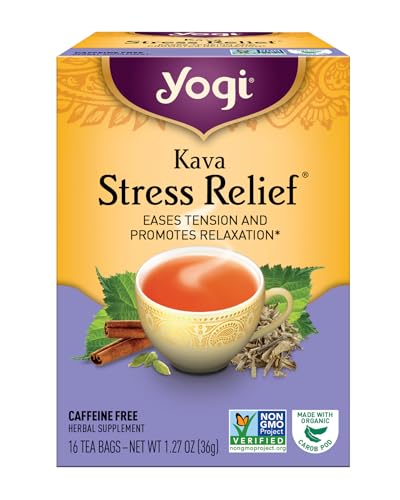To manage stress naturally, try sipping calming herbal teas like chamomile or lavender, and use essential oils such as lavender or chamomile with diffusers or for topical use. Incorporate mindful breathing and gentle yoga into your routine to promote relaxation. Taking outdoor walks or practicing meditation can also help reset your mood. By combining these methods, you’ll discover simple ways to ease stress—if you want to explore more effective options, just keep going.
Key Takeaways
- Herbal teas like chamomile, lavender, and lemon balm promote relaxation when brewed properly.
- Diffusing essential oils such as lavender and chamomile creates a calming environment at home.
- Practicing mindful breathing and meditation techniques helps anchor awareness and reduce stress.
- Gentle yoga and stretching exercises release muscle tension and enhance mental relaxation.
- Engaging in outdoor activities like forest walks and connecting with nature lowers cortisol levels naturally.

Yogi Tea, Kava Stress Relief, 16 Count
FLAVOR: Yogi Kava Stress Relief tea is a naturally spicy-sweet and warming blend of Kava, Cinnamon, Indian Sarsaparilla…
As an affiliate, we earn on qualifying purchases.
As an affiliate, we earn on qualifying purchases.
Herbal Teas for Calmness and Relaxation

Herbal teas have long been favored for their soothing effects and ability to promote relaxation. When exploring herbal tea varieties, you’ll find options like chamomile, lavender, and lemon balm, each known for calming properties. To maximize their benefits, follow simple brewing tips: use fresh, quality herbs, steep them in hot but not boiling water, and let them sit covered for 5-10 minutes. This preserves essential oils and flavors, ensuring a richer experience. Avoid over-steeping, which can lead to bitterness. Whether you prefer a gentle sip before bed or a calming break during the day, these teas can help ease stress naturally. Proper brewing guarantees you get the full calming potential from each herbal tea variety, making relaxation both accessible and enjoyable. Additionally, understanding regulatory guidelines can help you select safe and effective herbal products.

Air Wick Essential Mist Starter Kit, Diffuser + 1 Refill, Lavender and Almond Blossom, Air Freshener, Essential Oils
FRAGRANCE: A divine blend of freshness and softness, the fresh aromacy of lavender wrapped with the delicate sweet…
As an affiliate, we earn on qualifying purchases.
As an affiliate, we earn on qualifying purchases.
Aromatherapy With Essential Oils

Aromatherapy with essential oils offers a simple way to reduce stress and boost your mood. You’ll discover the benefits of popular blends like lavender and chamomile, which promote relaxation. Whether you use diffusers, topical applications, or inhalations, choosing the right method makes a difference in how you feel. Incorporating AI safety measures into the development of these products can help ensure their efficacy and safety for consumers.
Essential Oil Benefits
Essential oils offer a natural way to reduce stress and promote relaxation through aromatherapy. When you inhale the calming scent of lavender aroma, it can help ease anxiety and improve your mood. Lavender’s soothing properties make it a popular choice for stress relief. Peppermint oil, on the other hand, provides an invigorating burst of energy while also relieving tension. Its energizing aroma can clear your mind and reduce feelings of fatigue. Using these essential oils in a diffuser or applying them topically (diluted) allows you to harness their benefits easily. Regular use can create a calming atmosphere in your home or workspace, helping you stay centered amidst daily stressors. Incorporating lavender aroma and peppermint oil into your routine offers a simple, effective way to enhance your well-being naturally. Additionally, diffusing essential oils like lavender and peppermint can support respiratory health, making your environment more conducive to relaxation and clear breathing.
Popular Aromatherapy Blends
Popular aromatherapy blends combine different essential oils to amplify their stress-relieving effects and create inviting, calming environments. When exploring diy aromatherapy, you can craft personalized blends tailored to your preferences, mixing oils like lavender, chamomile, and bergamot. These combinations enhance relaxation and mood improvement while making your space feel more soothing. Additionally, incorporating high-quality ingredients ensures the effectiveness and safety of your blends. However, always prioritize essential oil safety by diluting oils properly and avoiding skin irritation or allergic reactions. Popular blends often feature citrus oils for uplifting energy or floral scents for calming effects. Experimenting with different combinations allows you to discover what works best for your stress relief routine. Just remember to research each oil’s properties and use high-quality ingredients to guarantee your blends are both effective and safe.
Application Methods
Since there are various ways to experience the calming effects of essential oils, choosing the right application method can enhance your stress relief routine. Diffusing oils in your home creates a soothing environment, promoting relaxation through inhalation, a popular alternative therapy for stress management. You can also add a few drops to a carrier oil for massage, allowing you to target tense areas directly. Inhaling oils from a personal inhaler or vaporizer offers quick relief, ideal for busy moments. Applying diluted oils to pulse points or the neck provides continuous calming effects. Using home gardening techniques to grow your own aromatic herbs, like lavender or chamomile, can also enhance your aromatherapy experience. Each method allows you to incorporate essential oils into your daily routine easily, making aromatherapy a versatile and effective tool for managing stress naturally.

Stash Tea Relax and Unwind Tea Sampler – Assorted Specialty Tea Gift Set, Calming Herbal Teas to Support Relaxation, 7 Flavors, 35 Tea Bags
Relax and rejuvenate with this tea sampler. Unwind and destress with every delicious sip, embracing a moment of…
As an affiliate, we earn on qualifying purchases.
As an affiliate, we earn on qualifying purchases.
Mindfulness Meditation Techniques

Have you ever wondered how just a few minutes of focused breathing can reduce your stress? Mindfulness meditation is a simple yet powerful tool for stress reduction. Find a quiet space, sit comfortably, and focus on your breath. When your mind wanders, gently bring it back to your breath without judgment. Consistency is key—practice daily for best results. Incorporating practical mindfulness techniques into your daily routine can help you find calm amidst the noise.

ASAKUKI Essential Oil Blends, Essential Oils for Diffusers for Home, Well-Being Kit- Calm Mind, Sweet Dreams, Happy, Relax, Air Freshening, Immunity for Aromatherapy, Humidifiers, Massage, 6x10ml
Essential Oil Blends: Introduce the long-lasting, pleasant, and relaxing aroma to your home with our Well-being aromatherapy diffuser…
As an affiliate, we earn on qualifying purchases.
As an affiliate, we earn on qualifying purchases.
Gentle Yoga and Stretching Exercises

Gentle yoga and stretching exercises offer a soothing way to release tension and promote relaxation throughout your body. When you engage in gentle yoga, you focus on slow, mindful movements that help ease muscle stiffness and calm your mind. Incorporating stretching exercises into your routine can improve flexibility and reduce stress-related tightness. These practices encourage deep breathing and mindful awareness, which help lower cortisol levels and promote a sense of calm. You don’t need advanced skills—simple stretches like neck rolls, shoulder shrugs, or seated twists are effective. Consistency is key; even a few minutes daily can make a difference. Additionally, research into sound healing indicates that integrating sound vibrations can enhance the relaxing effects of your practice. By integrating gentle yoga and stretching exercises into your day, you create a calming space that supports both your physical and mental well-being.
Breathing Exercises to Reduce Stress

Breathing exercises can quickly help you feel calmer when stress hits. Techniques like deep breathing and mindful breathing teach you to control your breath and stay present. By practicing these, you can reduce tension and restore a sense of calm throughout your day. Additionally, being aware of passive voice detection can help you write more clearly and confidently.
Deep Breathing Techniques
When stress starts to build, deep breathing techniques can quickly calm your mind and body. Focus on mindful breathing by taking slow, deliberate breaths, inhaling through your nose, and exhaling through your mouth. This form of relaxation technique helps reduce tension and lowers your heart rate. To practice, breathe in deeply for a count of four, hold for a count of four, then exhale slowly for four seconds. Repeat this process several times until you feel more grounded. Deep breathing activates your parasympathetic nervous system, promoting calmness. Incorporating these techniques into your daily routine can make a significant difference in managing stress. By consistently practicing deep breathing, you develop a simple yet powerful tool to alleviate anxiety whenever stress arises.
Mindful Breathing Practice
Building on deep breathing techniques, incorporating mindful breathing into your routine can deepen your sense of calm and help manage stress more effectively. Mindful breathing involves paying close attention to each breath, noticing the inhale and exhale without judgment. This practice enhances stress management by anchoring your awareness in the present moment. To get started, find a comfortable position, breathe naturally, and focus on the sensation of your breath. If your mind wanders, gently bring it back to your breathing. Use the table below to explore common mindful breathing methods:
| Technique | Focus Area |
|---|---|
| Diaphragmatic Breathing | Full lung expansion |
| Box Breathing | Controlled, equal breaths |
| 4-7-8 Breathing | Relaxation and sleep aid |
| Body Scan | Tension release |
Additionally, integrating meditation practices can further enhance your ability to reduce stress and promote overall well-being.
Herbal Supplements and Adaptogens

Herbal supplements and adaptogens have gained popularity as natural ways to combat stress because they can help balance your body’s response to pressure. When incorporating them, it’s important to take into account herbal supplement interactions and follow adaptogen dosage guidelines to avoid adverse effects. To get started:
Herbal supplements and adaptogens can help manage stress safely when dosed properly and interactions are considered.
- Research trusted adaptogens like ashwagandha or Rhodiola, known for stress reduction.
- Consult reliable sources to determine proper adaptogen dosage guidelines specific to your needs.
- Be aware of herbal supplement interactions, especially if you’re taking medications or other supplements.
- Start with small doses and monitor your body’s response before increasing intake.
- Consider the benefits of secure payment processing when choosing merchant services to ensure smooth transactions for your business.
This careful approach ensures you benefit from these natural remedies safely and effectively, helping you manage stress without unintended side effects.
Nature Walks and Outdoor Activities

Engaging in nature walks and outdoor activities offers a practical way to reduce stress and reconnect with your surroundings. Forest bathing, or spending time quietly immersed in the trees, helps lower cortisol levels and promotes relaxation. During these walks, focus on your senses—listen to birds, feel the breeze, and observe the natural beauty around you. Outdoor meditation is another effective method; find a peaceful spot, breathe deeply, and center your mind away from daily worries. These activities encourage mindfulness and help clear your mental clutter. Regularly spending time outdoors not only boosts your mood but also strengthens your connection with nature, creating a calming environment that naturally alleviates stress.
Creating a Stress-Relief Routine

Establishing a consistent stress-relief routine can make managing daily stress more effective and sustainable. To do this, focus on integrating simple, regular practices into your day through effective time scheduling. First, dedicate a specific time each day for relaxation techniques like deep breathing or meditation. Second, plan brief outdoor activities to reconnect with nature, boosting your stress management. Third, block out time for physical activity, which helps reduce stress hormones. Fourth, set aside moments for hobbies or mindfulness to refresh your mind. By establishing these habits, you create a structured approach to stress relief that fits your schedule. Consistency is key—over time, your routine will become second nature, making stress management easier and more natural.
Frequently Asked Questions
Are Natural Remedies Safe for Everyone?
You might wonder if natural remedies are safe for everyone. While herbal safety varies, many alternative therapies are generally safe when used properly. However, it’s important to take into account individual health conditions, allergies, and medications. You should always consult with a healthcare professional before starting any new remedy. By doing so, you ensure you’re making informed choices and minimizing potential risks associated with herbal safety and alternative therapies.
How Long Does It Take to See Stress Relief Results?
You might feel like stress relief happens overnight, but timing expectations vary. Usually, you begin to notice symptom improvement within a few days to weeks of consistent use. Some remedies work faster, while others take longer to show effects. Stay patient and committed; your body needs time to respond. Remember, natural remedies aren’t magic—consistent effort is key to achieving lasting stress relief and feeling calmer each day.
Can I Combine Multiple Natural Stress Remedies?
You can definitely combine multiple natural stress remedies. Holistic approaches and lifestyle modifications work best when tailored to your needs. Mixing techniques like meditation, herbal supplements, exercise, and deep breathing can enhance their effectiveness. Just make certain you listen to your body and don’t overdo it. Consulting a healthcare professional can help you create a balanced plan that supports your overall well-being while reducing stress naturally.
Are There Any Side Effects of Herbal Supplements?
You might wonder about herbal supplements’ side effects. It’s important to take into account herbal interactions, as some herbs can interact with medications or other supplements, causing adverse effects. Also, pay attention to dosage considerations, since taking too much can lead to unwanted symptoms. Always consult with a healthcare professional before starting any herbal supplement to ensure safety, especially if you’re on medication or have underlying health conditions.
How Often Should I Practice These Stress-Relief Techniques?
Think of practicing stress-relief techniques as watering a delicate plant—you need consistency to see it flourish. Typically, aim for daily sessions or at least several times a week. Follow the frequency guidelines that fit your schedule, and stick to them with consistency tips like setting reminders. Regular practice helps your mind and body adapt, making stress management feel natural and effortless over time.
Conclusion
By embracing natural remedies, you find calm amid chaos, peace in the rush. While herbal teas soothe your mind, outdoor walks refresh your spirit. As meditation quiets your thoughts, gentle stretches ease your body. These simple practices, both gentle and powerful, work together to restore balance. Stress may come relentlessly, but with these natural tools, you hold the power to relax, to breathe, to reclaim your serenity—one mindful step at a time.









